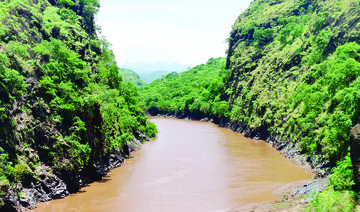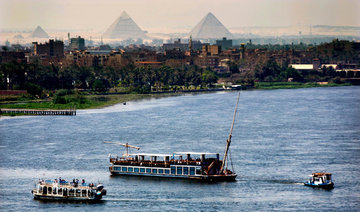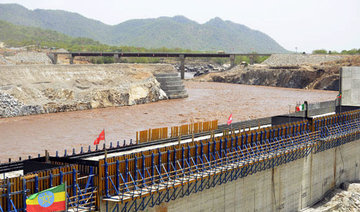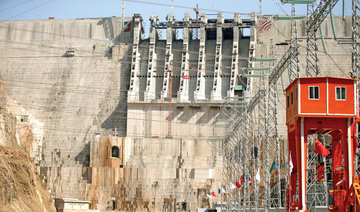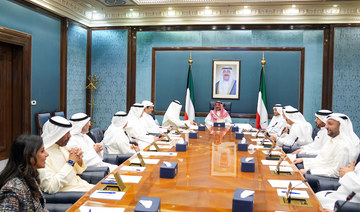CAIRO: There are fears that a unilateral attempt by Ethiopia to begin filling a huge new dam on the Nile will lead to the failure of technical discussions with Egypt and Sudan.
Disagreements between Ethiopia and Egypt on filling the reservoir and generating power within a few months on the Grand Ethiopian Renaissance Dam (GERD), which will be the largest in Africa, could not be resolved during the Tripartite National Technical Committee’s meeting, which brought together the Egyptian, Sudanese and Ethiopian ministers of water and was held in Addis Ababa on Oct. 19.
The day before the meeting, Ethiopia’s Communication and Information Technology Minister Debretsion Gebremichael announced that the construction of the dam had reached 62 percent and generating power would start this Ethiopian year and before construction is complete. The new Ethiopian year started on Sept. 11 and ends in October 2018.
“The remaining 38 percent of the construction will be done while the dam is generating hydroelectric power,” Gebremichael had told the Ethiopian News Agency.
Considering the slow pace at which the French consulting firms BRL and Artelia are preparing technical studies, it is speculated that before Ethiopia begins storing the Nile’s water in the dam, studies necessary for reaching a final agreement between Egypt, Ethiopia and Sudan on the rules of filling and operating the dam will be completed.
If no agreement takes place between the three countries, Ethiopia’s next step would be considered a clear violation of the tripartite Declaration of Principles on Ethiopia’s Renaissance Dam signed by Egyptian President Abdel Fattah El-Sisi, Sudanese President Omar Al-Bashir and Ethiopian Prime Minister Hailemariam Desalegn in Khartoum on March 23, 2015.
“Any unilateral attempt made by Ethiopia to initiate filling the dam would lead to the failure of the current technical discussions between the three countries,” said Dr. Ayman Shabana, professor of political science at the Institute of African Studies, Cairo University.
However, Hani Raslan, an expert on the Nile basin and Sudanese affairs at Al-Ahram Center for Strategic Studies, believes the declaration of principles does not provide a legally binding framework for Ethiopia since it obliges the three countries only to “respect” the terms and not “adhere” to them. “Respect can mean a different thing for each country,” he said.
“There are also controversial terms in the declaration of principles, especially the one that says filling the GERD reservoir is linked to completing joint technical studies,” he added, explaining that Ethiopia adopted “an elusive interpretation of this term.”
“Ethiopia has named two phases of the filling process: ‘The first filling,’ which it targets during the current stage in order to start generating power, and ‘the complete filling,’ which means filling the dam reservoir to its full capacity of 74 billion cubic meters,” he continued, “And it only associates the completion of technical studies and the filling and operation rules with the complete filling and not the first filling.”
Frozen negotiations
Egypt is increasingly concerned about Ethiopia’s intention to start storing water in the GERD reservoir before completing the technical studies and reaching a final agreement on filling and operation rules.
Egyptian Foreign Minister Sameh Shoukry discussed what he called the “frozen negotiations” of the tripartite technical committee. During a meeting with his Ethiopian counterpart, Workneh Gebeyehu, on the sidelines of the UN General Assembly on Sept. 21, Shoukry complained of the delay in issuing technical studies on the dam’s impact on Egypt and Sudan.
Egyptian President Abdel Fattah El-Sisi also pointed out the urgency of the speedy implementation of the declaration of principles on Ethiopia’s dam in his speech to the General Assembly on Sept. 19.
Shoukri explained that the reason behind the “slowdown” of issuing technical studies on the dam’s impact was the presence of obstacles that none of the three countries could overcome at technical or political levels. “These obstacles are a threat to the foundations of the Declaration of Principles agreement,” he said in an interview with Al-Ahram newspaper, published on Oct. 4.
He then added: “Not completing the technical studies prior to completing the dam’s construction and launching the filling process would make everyone suspect negotiations are being stalled to impede the report’s issuance.”
In spite of this, unofficial Egyptian sources acquainted with water management suggested that, to avoid the discussions failing, Egypt agree to the first filling of the GERD reservoir under three conditions:
First, the filling must be for trial purposes and not part of the actual filling process that leads to the dam’s official operation.
Second, the target water level of the first filling must be only enough for operating the two turbines installed by Ethiopia at the dam’s lower part, provided filling stops immediately after reaching this level and is resumed only after the completion of technical studies and reaching a final tripartite agreement on the rules of filling and operation. Egyptian sources estimated the amount of water needed for this purpose would be around 15 billion cubic meters.
Third, the first filling must be completed over two years, according to the same unofficial Egyptian sources, and not one year or less as planned by Ethiopia.
Dr. Shabana, of the Institute of African Studies at Cairo University, agrees with the above insight, stressing that “any step taken by Ethiopia toward initiating the filling process must be for trial purposes only and in full coordination with Egypt, as required by the declaration of principles.”
In Raslan’s opinion, Egypt currently lacks the tools for pressuring Ethiopia, which means it has to accept Ethiopia’s unilateral filling approach.
He also pointed out that the time at which the Ethiopian government announced its unilateral intention to start filling the GERD reservoir, which coincided with the tripartite technical committee’s meeting in Addis Ababa, confirms Ethiopia’s approach of refusing legal commitment as well as negotiations about its construction of GERD and development of its filling and operation rules. “Ethiopia refused to discuss the matter. Instead, it unilaterally announced it,” he said.
“In practice, Ethiopia does not respect the declaration of principles nor the technical discussions, but uses them as a façade to show goodwill and an alleged desire to cooperate with Egypt and Sudan and not harm them,” he continued. “Ethiopia’s ultimate and strategic goal is to completely and unilaterally control the Nile’s revenue, which is 48-50 billion cubic meters of water annually and accounts for most of Egypt’s annual allocation of the Nile’s water.”
Arab News sought a comment on this information from the Egyptian Ministry of Water Resources and Irrigation, but the ministry’s spokesperson declined to comment.
Technical committee
Technical matters associated with the best mechanism for filling and operating the Renaissance Dam without affecting the two downstream countries, Egypt and Sudan, are still being debated after the Tripartite National Technical Committee, composed of 12 experts from Sudan, Egypt and Ethiopia, held 16 rounds of negotiations, the latest of which was on Oct. 15 in Addis Ababa, to reach an agreement on the initial technical report submitted by the two French consulting firms, BRL and Artelia, in late March 2017.
On Sept. 20, 2016 in the Sudanese capital Khartoum, the three countries signed the contracts for the technical studies with the two French firms, marking the preparation for a technical file on the Renaissance Dam and its effect on downstream countries. The studies were supposed to be finalized by the two French firms last August according to the time frame of 11 months defined by the declaration of principles agreement, followed by the Khartoum Document, which was signed by the three countries’ foreign ministers in December 2015, in addition to a period of four months dedicated for the technical committee’s members to reach consensus on how to implement the studies’ outcomes.
“Ethiopia’s strategy is to either impose its views during the technical discussions or withdraw from all agreements and restart negotiations from scratch,” Raslan said. “Faced with this approach, Egypt had no decisive negotiation strategy and relied instead on successive concessions in hopes of mellowing Ethiopia, which never happened.”
Egypt’s Water Resources and Irrigation Minister Mohamed Abdel Ati predicted earlier that Ethiopia would start storing water in the GERD reservoir next year.
On Sept. 28, 2017, Misr News Agency quoted the minister saying: “The impact of the Renaissance Dam has not yet been experienced because the flow of water into Egypt is no different from that experienced during previous years, but it is very likely that part of the dam will be filled next year.”
He also stressed the importance of consensus on the method of filling and operating the dam.
In a press statement published on Oct. 18, 2017, the Ministry of Water Resources and Irrigation said that Egypt confirmed no water had been stored behind GERD this year and nothing was impeding the flow of water into the country until now.
The press statement was released a day after an Egyptian delegation, headed by Abdel Ati, on Oct. 17 visited the dam in Benishangul, which is 20 km from the Sudanese border, and “the visit was the first of its kind for an Egyptian government official.”
Complete filling
In addition to the dispute over Ethiopia’s intention to start the unilateral filling of the GERD reservoir as part of what it calls “the first filling,” what Ethiopia calls “the complete filling” poses a greater danger, said Hani Raslan, Nile basin and Sudanese affairs expert.
“Ethiopia insists on filling the reservoir within three years, which will deprive Egypt of around 25 billion cubic meters of water every year — almost half of its annual allocation of the Nile’s water,” Raslan explained. “Egypt, on the other hand, demanded filling the reservoir over a period of nine years.”
“If we take into account the annual loss of water caused by leakage and evaporation, the complete filling is expected to drain almost 90 billion cubic meters of water, not 74 billion cubic meters, which represents the final storage volume,” he added.
In the context of a strategic approach supported by several international and regional parties to reshape and strengthen Ethiopia’s influence and turn it into the greatest power in East Africa and the Nile basin, Addis Ababa has plans to export hydroelectric power.
Ethiopian attempt to begin filling Renaissance Dam may scupper deal with Egypt and Sudan, say experts
Ethiopian attempt to begin filling Renaissance Dam may scupper deal with Egypt and Sudan, say experts

Kuwait economic fund signs coordination MoU with ILO
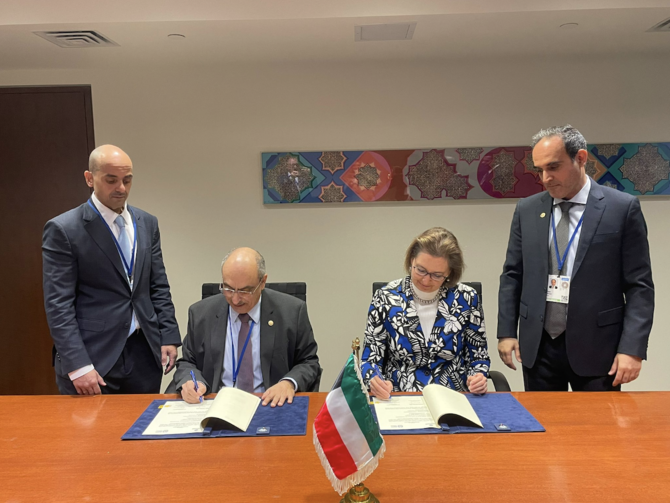
- MoU aims to coordinate joint actions in economic and social development in developing countries
WASHINGTON: The Kuwait Fund for Arab Economic Development has agreed a memorandum of understanding with the International Labor Organization to enhance development cooperation, Kuwait News Agency reported.
The MoU was signed by KFAED Acting Director General Waleed AI-Bahar and ILO Assistant Director General for External and Corporate Relations Laura Thompson on the sidelines of the 2024 spring meetings of the International Monetary Fund and World Bank in Washington DC.
The MoU establishes a framework for technical cooperation and aims to coordinate joint actions in economic and social development in developing countries. This includes exchanging expertise and information in economic, financial and commercial sectors.
The five-year renewable agreement focuses on collaborative activities aligned with the goals of both organizations in the countries in which they operate. The partnership will also involve sharing resources in areas of mutual interest such as statistics, policy enhancement, youth economic empowerment, gender equality at work, crisis response and South-South cooperation.
Regular consultations are planned to ensure effective coordination of operations in the targeted nations.
International reactions after Israel’s reported attack on Iran
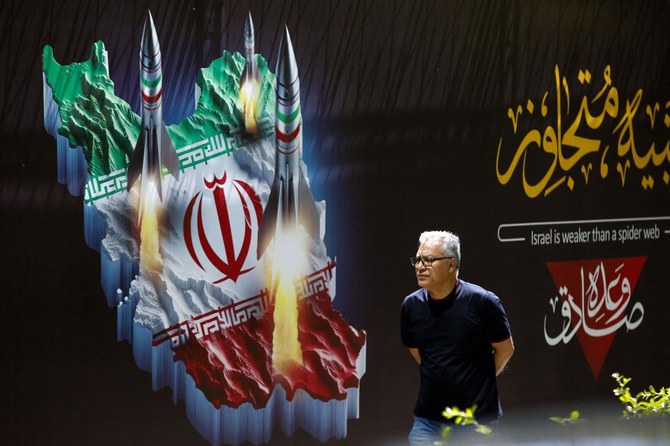
- Widespread calls for utmost restraint between Iran and Israel to avoid serious repercussions
PARIS: Here are some international reactions Friday after Israel’s reported attack on the Iranian province of Isfahan, where it has military bases and nuclear facilities:
UN SECRETARY-GENERAL ANTONIO GUTERRES
UN Secretary-General Antonio Guterres reiterated that it was “high time to stop the dangerous cycle of retaliation in the Middle East,” his spokesperson said in a statement.
“The Secretary-General condemns any act of retaliation and appeals to the international community to work together to prevent any further development that could lead to devastating consequences for the entire region and beyond,” Stephane Dujarric said.
RUSSIA
Russia has made clear to Israel that Iran “does not want escalation,” Moscow’s foreign minister Sergei Lavrov said Friday, after reports Israel had carried out retaliatory strikes against its arch-rival.
“There have been telephone contacts between the leadership of Russia and Iran, our representatives and the Israelis. We made it very clear in these conversations, we told the Israelis that Iran does not want escalation,” Lavrov said in an interview with Russian radio stations.
UAE
The United Arab Emirates’ foreign ministry on Friday expressed concern about regional tensions in a statement, calling for ‘utmost restraint’ to avoid serious repercussions.
JORDAN
Jordan’s Foreign Minister Ayman Safadi said on Friday Israeli-Iranian retaliations must end, warning against danger of regional escalation.
GERMANY
German Chancellor Olaf Scholz called for de-escalation following a strike on the Iranian city of Isfahan and said Berlin would work with its partners in this direction.
“De-escalation remains the order of the day in the near future. And we will also talk about this with all our friends and allies, and work together with them in this direction,” Scholz told reporters on Friday.
G7
G7 foreign ministers Friday urged “all parties” to “work to prevent further escalation” in the Middle East, following reports that Israel had carried out revenge strikes on Iran.
“In light of reports of strikes on April 19th, we urge all parties to work to prevent further escalation. The G7 will continue to work to this end,” the Group of Seven industrialized nations said in a statement.
The ministers from Italy, the UK, US, France, Germany, Japan and Canada said they “demand that Iran and its affiliated groups cease their attacks”.
SPAIN
Spanish Prime Minister Pedro Sanchez called Friday for all sides to avoid “an escalation of the conflict in the Middle East” after reports that Israel carried out retaliatory strikes on Iran.
“We must avoid any action that would lead to an escalation of the conflict in the Middle East. The seriousness of the moment demands responsibility and restraint from all parties,” he wrote on X.
JAPAN’S CHIEF CABINET SECRETARY YOSHIMASA HAYASHI
“Japan is deeply concerned about the situation in the Middle East and strongly condemn any actions that lead to the escalation of the situation.
“Japan will continue to make all necessary diplomatic efforts to prevent the situation from worsening further.”
CHINA
“China opposes any actions that further escalate tensions and will continue to play a constructive role to de-escalate the situation,” said foreign ministry spokesman Lin Jian.
IAEA
“IAEA can confirm that there is no damage to Iran’s nuclear sites. Director General Rafael Grossi continues to call for extreme restraint from everybody and reiterates that nuclear facilities should never be a target in military conflicts. IAEA is monitoring the situation very closely,” the International Atomic Energy Agency said on X.
OMAN
“The Sultanate of Oman is following the continuing tension in the region and condemns the Israeli attack this morning on Isfahan,” the foreign ministry said, adding that it also “condemns and denounces Israel’s repeated military attacks in the region.
“Oman once again appeals to the international community to address the causes and roots of tension and conflict through dialogue, diplomacy and political solutions, and to focus on ceasefire efforts in Gaza and resort to international law and United Nations resolutions to reach a just and lasting solution to the Palestinian issue.”
EC PRESIDENT URSULA VON DER LEYEN
“We have to do everything possible (so) that all sides restrain from the escalation in that region ... It is absolutely necessary that the region stays stable and that all sides refrain from further action,” European Commission president Ursula von der Leyen.
UK
“We have condemned Iran’s reckless and dangerous barrage of missiles against Israel on Saturday and Israel absolutely has a right to self-defense. But as I said to Prime Minister Netanyahu when I spoke to him (this week) and more generally, significant escalation is not in anyone’s interest, what we want to see is calm heads prevail across the region,” Prime Minister Rishi Sunak said.
ITALY
“We invite everyone to be cautious to avoid an escalation,” Foreign Minister Antonio Tajani told RAI news on Capri where Italy is hosting a meeting of foreign ministers from the Group of Seven nations.
“This is something we from the government’s side take very seriously and are following very closely,” Foreign Minister Tobias Billstrom said.
“There has to be an end to the exchange of blows and escalation.”
Gazans cool down in seawater despite nearby Israeli vessels

- Soaring temperatures in the embattled Palestinian enclave have prompted Gazan children to resort to the sea
RAFAH: Soaring temperatures in Gaza during the past week have driven thousands in the enclave’s southern city of Rafah to seek respite on beaches.
The proximity to Israeli military vessels did not stop hundreds of war-weary Gazans from bringing their children to enjoy a day of paddling and swimming, according to Arab News’ reporter in the embattled Palestinian enclave.
Many of the 1.4 million displaced Palestinians in Rafah live in makeshift shelters, including tents, on the beach, near the Egyptian border.
Since the Israeli onslaught on the Gaza Strip broke out on Oct. 7 last year, Gazans have been forced to resort to salty seawater for washing, bathing and even drinking due to the collapse of the water system.
Dubai carrier Emirates suspends check-in for onward connections, flydubai cancels Iran flights

- Dubai International Airport temporarily limiting the number of arriving flights for 48 hours from 12 p.m. on Friday
DUBAI: Dubai’s flagship airline Emirates is suspending check-in for all customers with onward connections through the city until 2359 GMT on Friday, three days after a record storm swept the United Arab Emirates.
Emirates, one of the world’s biggest international airlines, said customers traveling to Dubai as their final destination may check-in and travel as usual.
The suspension shows the airline and its hub, Dubai International Airport, are still struggling to clear a backlog of flights after the UAE saw its heaviest rains in the 75 years records have been kept, bringing much of the country to a standstill for two days and causing significant damage.
Dubai International airport, one of the world’s busiest, later said it was temporarily limiting the number of arriving flights for 48 hours from 12 p.m. on Friday to speed up recovery operations from rain and flooding.
Thousands of passengers have been affected by flight cancelations this week, Dubai Airports Chief Executive Paul Griffiths told local radio station Dubai Eye on Friday, after the storm flooded taxiways.
The storm, which hit neighboring Oman on Sunday, pounded the UAE on Tuesday, with 20 reported dead in Oman and one in the UAE.
Dubai’s budget carrier flydubai meanwhile canceled flights to Iran on Friday after receiving an official alert, a statement said.
“In line with the issued NOTAM (notice to air missions), our flights to Iran today have been canceled,” said the statement.
One flight which had already departed for Tehran returned to Dubai after the Iranian capital’s airport was closed, it added.
Flights were suspended across swathes of Iran as Iranian state media reported explosions in the central province of Isfahan.
Flight-tracking software showed commercial flights avoiding western Iran, including Isfahan, and skirting Tehran to the north and east.
The main road that connects the UAE’s most populous emirate Dubai with Abu Dhabi remains partially closed, while an alternative route into Dubai requires vehicles to use a road that is entirely covered in floodwater where cars and buses have been abandoned.
In the UAE’s north, including in the emirate of Sharjah, people were reportedly still trapped in their homes, while others there said there had been extensive damage to businesses.
Rains are rare in the UAE and elsewhere on the Arabian Peninsula, which is typically known for its dry desert climate where summer air temperatures can soar above 50 degrees Celsius.
The UAE’s National Center of Meteorology said on social platform X that Monday may see light rainfall by late night and forecast “a chance of light to moderate rainfall, might be heavy at times over some areas” for Tuesday, with a fall in temperatures over some coastal areas.
Iran closes air space, commercial flights diverted after apparent Israeli retaliatory strikes

- Drones shot down over Isfahan, says Iranian state media
- Israel military refuses to comment on incident
DUBAI/WASHINGTON: Israeli missiles have hit a site in Iran, ABC News reported late on Thursday, citing a US official, while Iranian state media reported an explosion in the center of the country, days after Iran launched a retaliatory drone strike on Israel.
Commercial flights began diverting their routes early Friday morning over western Iran without explanation as one semiofficial news agency in the Islamic Republic claimed there had been “explosions” heard over the city of Isfahan.
Some Emirates and Flydubai flights that were flying over Iran early on Friday made sudden sharp turns away from the airspace, according to flight paths shown on tracking website Flightradar24.
“Flights over Isfahan, Shiraz and Tehran cities have been suspended,” state media reported.
Iranian officials said its air defenses did shot down several drones but there had been “no missile attack for now” on the country.
The state-run IRNA news agency reported that Iran fired air defense batteries early Friday morning across several provinces after reports of explosions near the city of Isfahan.
Several drones “have been successfully shot down by the country’s air defense, there are no reports of a missile attack for now,” Iran’s space agency spokesman Hossein Dalirian says on X.
The Fars news agency said “three explosions” were heard near the Shekari army airbase near Isfahan.
Iran’s local media also reported that nuclear facilities in Isfahan were “completely secure” after explosions were heard near the area.
“Nuclear facilities in Isfahan province are completely secure,” Tasnim news agency reports, quoting “reliable sources.”
Israel had said it would retaliate against Iran’s weekend attack, which involved hundreds of drones and missiles in retaliation for a suspected Israeli strike on its embassy compound in Syria. Most of the Iranian drones and missiles were downed before reaching Israeli territory.
Several Iranian nuclear sites are located in Isfahan province, including Natanz, centerpiece of Iran’s uranium enrichment program. Isfahan, Isome 350 kilometers (215 miles) south of Iran’s capital, Tehran, is also home to a major air base for the Iranian military.
Meanwhile in Iraq where a number of Iranian-backed militias are based, residents in Baghdad reported hearing sounds of explosions, but the source of the noise was not immediately clear.
In Syria, a local activist group said strikes hit an army position in the south of the country Friday.
“There were strikes on a Syrian army radar position,” said Rayan Maarouf, who runs the Suwayda24 anti-government website that covers news from Sweida province in the south.
Iranian military positions in Syria had been frequently targetted by Israeli air strikes over the past years. Early this month, an Israeli strike demolished a consular building annex of the Iranian Embassy in Sydia's capital Damascus, killing 13 people, including two generals of Iran's Revolutionary Guards, triggering the Iranian missiles and drones attack on Israel on April 13.
At the United Nations Security Council on Thursday, Iran urged member nations that Israel “must be compelled to stop any further military adventurism against our interests” as the UN secretary-general warned that the Middle East was in a “moment of maximum peril.”
Israel had said it was going to retaliate against Iran’s April 13 missile and drone attack.
Analysts and observers have been raising concerns about the risks of the Israel-Gaza war spreading into the rest of the region.
Oil prices and jumped on the reports of the Israeli strike. Brent crude futures rose 2 percent to $88.86 a barrel, the dollar gained broadly, gold rose 1 percent and S&P 500 futures dropped 1 percent.
Israel’s assault on Gaza began after Palestinian Islamist group Hamas attacked Israel on Oct. 7, killing 1,200, according to Israeli tallies.
Israel’s military offensive has killed over 33,000 Palestinians in Gaza, according to the local health ministry.
Iran-backed groups have declared support for Palestinians, launching attacks from Lebanon, Yemen and Iraq.


